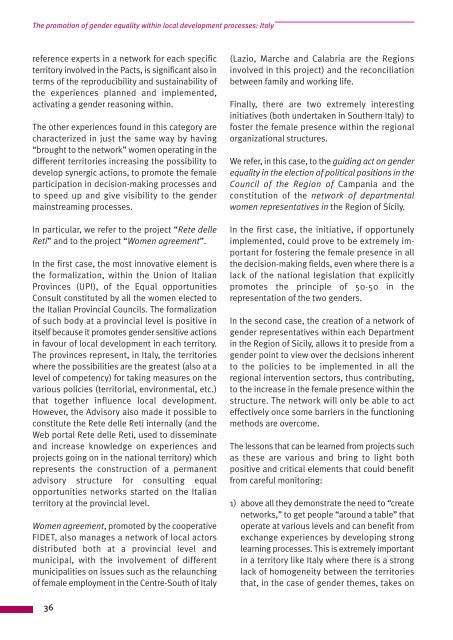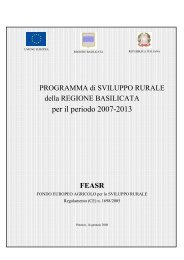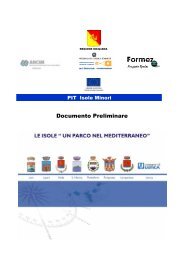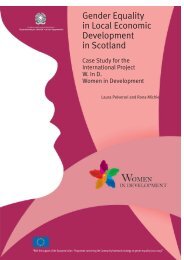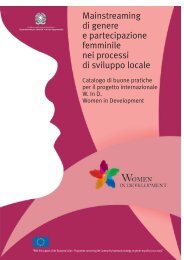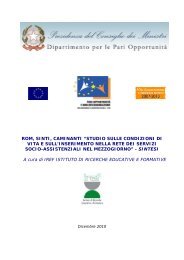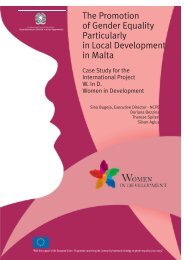The Promotion of Gender Equality within Local Development ...
The Promotion of Gender Equality within Local Development ...
The Promotion of Gender Equality within Local Development ...
You also want an ePaper? Increase the reach of your titles
YUMPU automatically turns print PDFs into web optimized ePapers that Google loves.
<strong>The</strong> promotion <strong>of</strong> gender equality <strong>within</strong> local development processes: Italyreference experts in a network for each specificterritory involved in the Pacts, is significant also interms <strong>of</strong> the reproducibility and sustainability <strong>of</strong>the experiences planned and implemented,activating a gender reasoning <strong>within</strong>.<strong>The</strong> other experiences found in this category arecharacterized in just the same way by having“brought to the network” women operating in thedifferent territories increasing the possibility todevelop synergic actions, to promote the femaleparticipation in decision-making processes andto speed up and give visibility to the gendermainstreaming processes.In particular, we refer to the project “Rete delleReti” and to the project “Women agreement”.In the first case, the most innovative element isthe formalization, <strong>within</strong> the Union <strong>of</strong> ItalianProvinces (UPI), <strong>of</strong> the Equal opportunitiesConsult constituted by all the women elected tothe Italian Provincial Councils. <strong>The</strong> formalization<strong>of</strong> such body at a provincial level is positive initself because it promotes gender sensitive actionsin favour <strong>of</strong> local development in each territory.<strong>The</strong> provinces represent, in Italy, the territorieswhere the possibilities are the greatest (also at alevel <strong>of</strong> competency) for taking measures on thevarious policies (territorial, environmental, etc.)that together influence local development.However, the Advisory also made it possible toconstitute the Rete delle Reti internally (and theWeb portal Rete delle Reti, used to disseminateand increase knowledge on experiences andprojects going on in the national territory) whichrepresents the construction <strong>of</strong> a permanentadvisory structure for consulting equalopportunities networks started on the Italianterritory at the provincial level.Women agreement, promoted by the cooperativeFIDET, also manages a network <strong>of</strong> local actorsdistributed both at a provincial level andmunicipal, with the involvement <strong>of</strong> differentmunicipalities on issues such as the relaunching<strong>of</strong> female employment in the Centre-South <strong>of</strong> Italy(Lazio, Marche and Calabria are the Regionsinvolved in this project) and the reconciliationbetween family and working life.Finally, there are two extremely interestinginitiatives (both undertaken in Southern Italy) t<strong>of</strong>oster the female presence <strong>within</strong> the regionalorganizational structures.We refer, in this case, to the guiding act on genderequality in the election <strong>of</strong> political positions in theCouncil <strong>of</strong> the Region <strong>of</strong> Campania and theconstitution <strong>of</strong> the network <strong>of</strong> departmentalwomen representatives in the Region <strong>of</strong> Sicily.In the first case, the initiative, if opportunelyimplemented, could prove to be extremely importantfor fostering the female presence in allthe decision-making fields, even where there is alack <strong>of</strong> the national legislation that explicitlypromotes the principle <strong>of</strong> 50-50 in therepresentation <strong>of</strong> the two genders.In the second case, the creation <strong>of</strong> a network <strong>of</strong>gender representatives <strong>within</strong> each Departmentin the Region <strong>of</strong> Sicily, allows it to preside from agender point to view over the decisions inherentto the policies to be implemented in all theregional intervention sectors, thus contributing,to the increase in the female presence <strong>within</strong> thestructure. <strong>The</strong> network will only be able to acteffectively once some barriers in the functioningmethods are overcome.<strong>The</strong> lessons that can be learned from projects suchas these are various and bring to light bothpositive and critical elements that could benefitfrom careful monitoring:1) above all they demonstrate the need to “createnetworks,” to get people “around a table” thatoperate at various levels and can benefit fromexchange experiences by developing stronglearning processes. This is extremely importantin a territory like Italy where there is a stronglack <strong>of</strong> homogeneity between the territoriesthat, in the case <strong>of</strong> gender themes, takes on36


